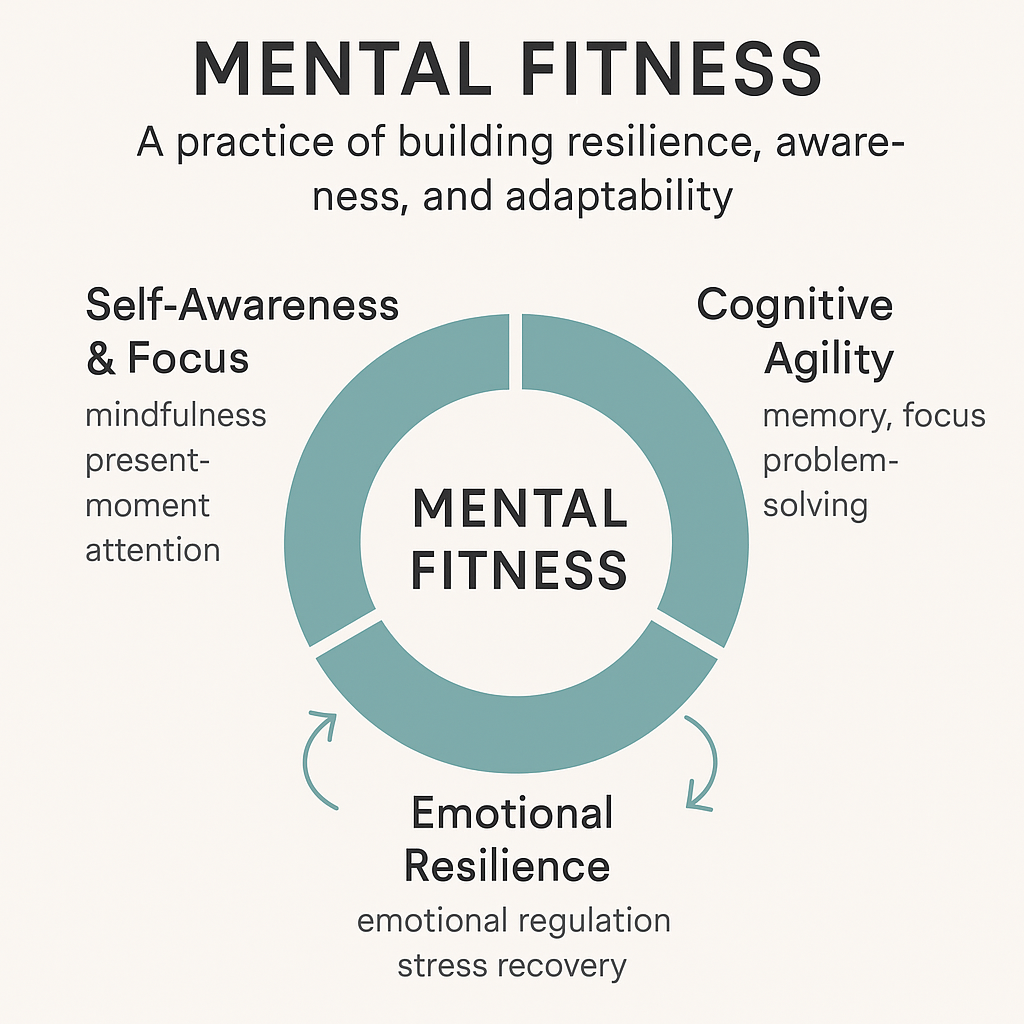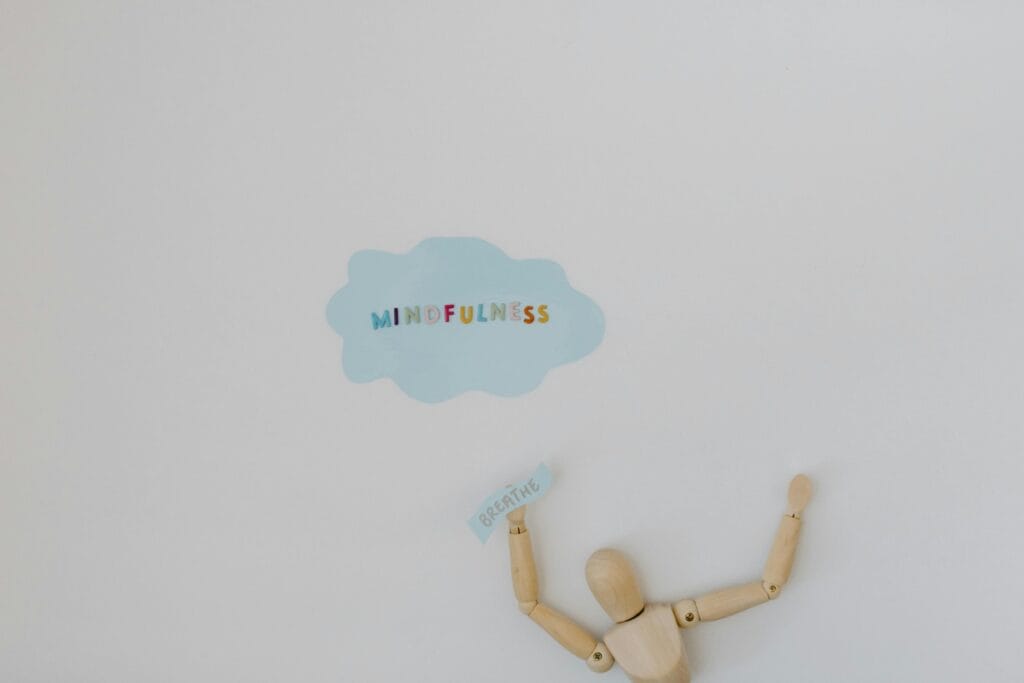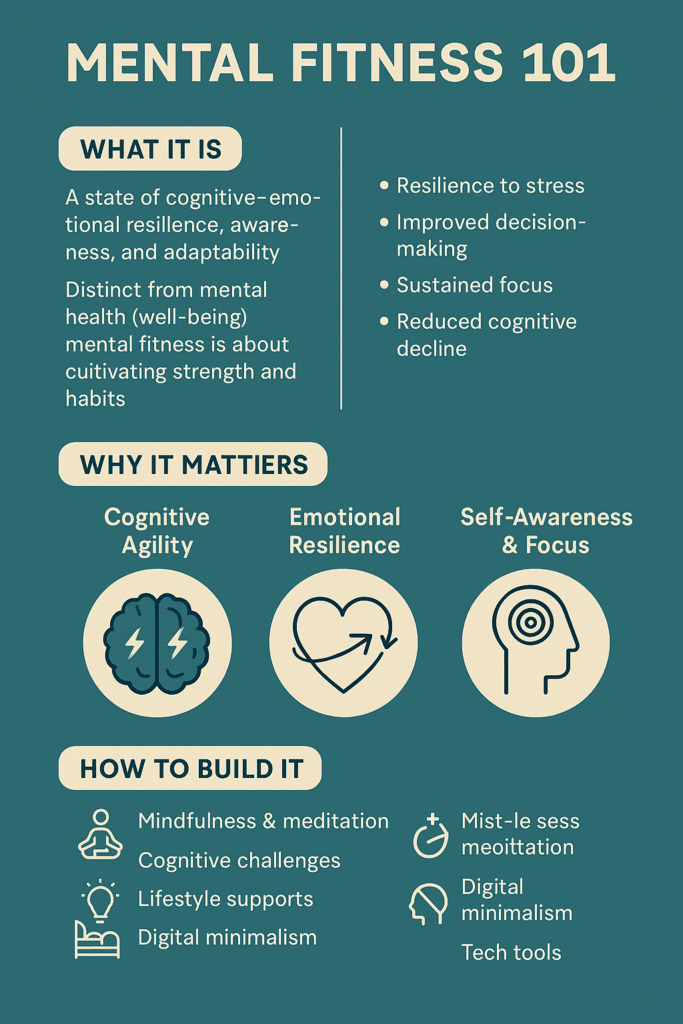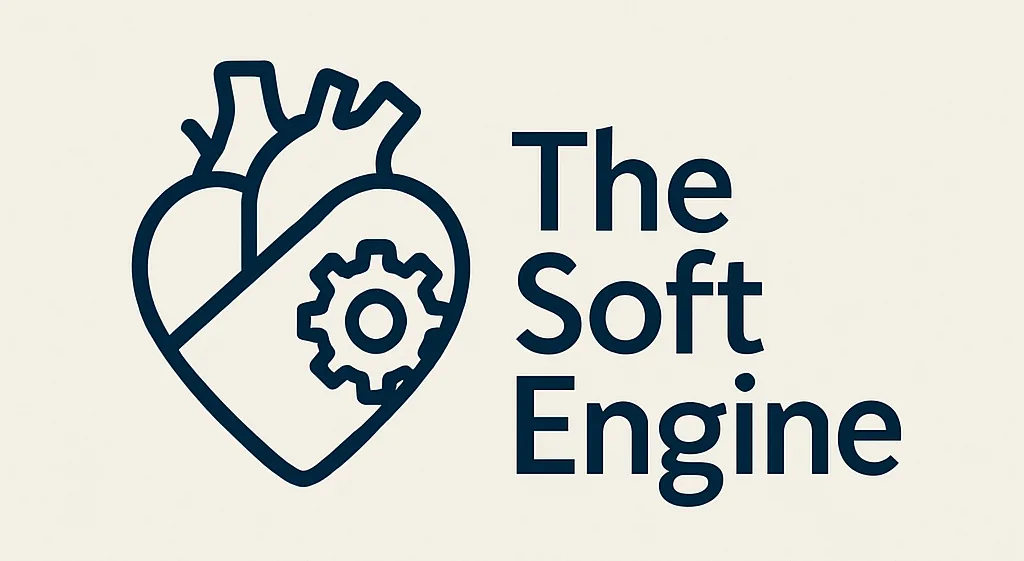We spend hours sculpting our bodies, tracking steps, watching macros—all in the name of physical fitness. But what about the mind?
Mental fitness is strength training for your mind. Instead of lifting weights, you’re building clarity, resilience, and emotional agility. And just like physical fitness, it’s trainable.
No matter your starting point, mental fitness is a practice you can build—one small habit at a time.
Let’s break through the jargon and dive into what matters, i.e., what mental fitness actually means, why it’s essential in the current attention economy, and how to build a sustainable, effective mental fitness plan to keep you quick and antifragile.
Mental Fitness vs Mental Health
If physical fitness is about building strength and endurance in the body, mental fitness is how we train the mind to stay sharp and steady—even when life doesn’t allow it.
At its core, mental fitness is your ability to think clearly, respond intentionally, and recover quickly from stress. It’s a mix of cognitive agility, emotional self-awareness, and behavioral adaptability. This inner skill set helps you pivot instead of panic, stay focused under pressure, and make better decisions when things get messy.
And here’s the key: mental fitness isn’t just for people in crisis, and it isn’t the same as mental health.
Mental health is your overall psychological state. It’s everything from your mood and energy to clinical conditions like anxiety or depression. Mental fitness is the daily maintenance and training that helps you function at your best before things unravel.
Luckily, there’s good news. Like how you go to the gym to improve your physical strength, you can build your mental fitness for clarity.
With consistent mental fitness exercises (from mindfulness and movement to reflection and challenge), you can strengthen the neural pathways that support your brain’s function.

Why Mental Fitness Matters
We tend to notice the mind most when it’s overwhelmed. You know the feeling: you’re distracted, reactive, or emotionally worn down. Nothing makes sense and everything is overwhelming.
But mental fitness is about being ready before that point. It’s the difference between reacting impulsively and responding with clarity, between burnout and sustainable energy.
Research shows that those who train their minds the way they train their bodies enjoy real, measurable benefits:
- Greater stress resilience: the ability to bounce back, not just endure.
- Improved decision-making, especially under pressure.
- Sharper focus: fewer distractions, more flow.
- Better emotional regulation: meaning fewer outbursts, more grounded responses.
Long-term, these effects compound. People with strong mental fitness habits often report better relationships, increased workplace productivity, and a deeper sense of well-being. It’s also a protective factor—a daily buffer against anxiety, burnout, and cognitive fatigue.
This matters whether you’re a high performer, a parent, or just someone trying to navigate a complex world.
Core Components and Related Concepts
Mental fitness isn’t one single ability. It’s more like a balanced ecosystem. To function at your best, your mind needs strength, flexibility, and space to recover.
That’s why true mental fitness draws from multiple domains: cognitive agility, emotional resilience, and self-awareness.
Here’s how each one plays a role and why they matter.
1. Cognitive Agility
This is your mind’s ability to adapt, shift gears, and stay sharp. It includes focus, memory, problem-solving, and the mental flexibility to respond to change without losing momentum.
You train it by challenging your brain in meaningful ways. Not just brain games, but learning a new language, exploring unfamiliar topics, or applying creative thinking to everyday problems.
Even regular aerobic exercise enhances neuroplasticity, giving your brain the tools to rewire, rebuild, and stay alert.
Forget about your IQ. Here, you want to practice the ability to be mentally nimble in a world that rarely stays still.
2. Emotional Resilience
This is your internal shock absorber. In an ideal situation, you can feel deeply without getting stuck and experience complex emotions without being ruled by them.
Through emotional fitness training, you learn to notice emotions as they arise, understand where they’re coming from, and respond with more choice and less reactivity. This doesn’t mean being “positive” when you’re feeling the exact opposite. Instead, you want to build the capacity to feel emotional discomfort and still move forward with clarity.
Resilient people still get overwhelmed, but they bounce back faster and with less damage to their relationships, self-trust, and well-being. That’s the goal.
3. Self-Awareness and Focus
This is where everything integrates: the ability to observe your thoughts and behaviors without immediately reacting. It’s the foundation of all mental training, because if you can’t see your patterns, you can’t shift them.
Practices like mindfulness meditation, structured journaling, and intentional rest help strengthen this muscle. So does digital hygiene (limiting distractions so you can hear your own thoughts again).
In a culture of overstimulation, reclaiming your focus is a form of mental rebellion—and a necessary one.
These components don’t work in isolation. They’re interdependent, like stability, strength, and mobility in physical training.
You’ll also hear adjacent terms like mental toughness, grit, or psychological resilience. These emphasize endurance—pushing through pain. Mental fitness includes that, but broadens the picture. You don’t want to just survive hardship. You want to thrive despite it.
And just like physical fitness, this kind of growth happens by design.

How to Build Mental Fitness: Practical Strategies
You don’t need hours of free time or a therapist’s toolkit to build mental fitness. What you need is consistency and small, intentional actions that challenge your mind, calm your nervous system, and expand your emotional bandwidth.
1. Mindfulness and Meditation
Even 10 minutes of mindfulness a day can improve focus, emotional regulation, and stress recovery. Mindfulness trains the brain to notice thoughts without being swept away by them—a core skill in any mental fitness plan.
You can begin with breath-focused meditation, body scans, or guided audio sessions (like those found in Calm or Headspace).
2. Cognitive Challenges
Your brain thrives on novelty. Learning a new language, solving puzzles, reading complex material, or playing strategy games helps develop mental flexibility and attention control.
This kind of mental fitness exercise strengthens the prefrontal cortex, your center for decision-making, impulse control, and focus.
3. Lifestyle Habits That Support the Brain
Your body and mind don’t live in separate silos. Sleep, movement, and nutrition have profound effects on cognition and mood:
- Prioritize quality sleep: This is when your brain clears waste, consolidates memory, and restores balance.
- Exercise regularly: Aerobic activity, especially, has been shown to support brain-derived neurotrophic factor (BDNF), a protein key to learning and emotional resilience.
- Eat brain-supportive foods: Omega-3 fats, leafy greens, berries, and hydration all play a role in supporting mental health fitness.
4. Digital Hygiene and Focus Rituals
Your mind wasn’t built to handle constant interruption. Every ping, swipe, or tab switch pulls attention away from the deeper cognitive work that actually strengthens mental fitness.
That’s where digital hygiene comes in. We’re not saying you have to go off-grid, but you should be much more deliberate with your time.
Batch your emails. Mute nonessential notifications. Use tools like the Pomodoro Technique to protect blocks of focused time. Even a 90-minute deep work window, uninterrupted, can reset your mental clarity.
Create a simple ritual: one task, one space, one intention. These moments of single-tasking are key to preserving your cognitive energy and building the muscle of sustained attention.
This is especially useful if you’re trying to keep your mind fit at work, where your attention is likely constantly under siege. Small shifts in your digital habits can make a huge difference in how mentally steady you feel throughout the day.
5. Tech-Enhanced Mental Fitness
Being chronically online doesn’t always have to be a bad thing. If used well, technology can be a powerful training tool.
A new wave of mental fitness tech is making practices like meditation, emotional tracking, and cognitive optimization more accessible and personalized.
- Muse gives you real-time EEG feedback while you meditate, helping you train awareness and calm more effectively.
- Apollo Neuro uses gentle vibrations to stimulate your parasympathetic nervous system, supporting calm, recovery, and focus.
- AI-powered platforms like Positive Intelligence help you spot mental “saboteurs”— like self-judgment or distraction—and shift toward more grounded, clear-headed responses.
Of course, these aren’t magic bullets. But when combined with foundational habits like mindfulness and sleep, they can give you clearer feedback as you build your mental fitness plan.

Measuring and Tracking Progress
You can’t improve what you don’t notice, but that doesn’t mean mental fitness is about spreadsheets or perfect streaks.
It’s not measured by how many apps you use or how long you meditate. It’s measured by how you show up: how you respond instead of react, how quickly you recover, how often you feel calm and clear even when things are chaotic.
That said, a few simple ways to track your progress can go a long way in helping you stay consistent and motivated.
1. Start with What You Notice
Start by watching your patterns:
- Are you less reactive to stress or criticism?
- Do you bounce back more quickly when something throws you off?
- Are you able to focus for longer stretches?
- Do you catch yourself before spiraling, or pause before reacting?
These subtle shifts matter. Keep a simple log (not a deep journal unless you enjoy it), just quick notes about your energy, mood, focus, or how you handled a tough moment.
Over time, that becomes your feedback loop. It shows you what’s working, what’s shifting, and where to lean in next.
2. Try Structured Tools (If You Like Them)
If you prefer structure, there are several frameworks designed to measure mental fitness more formally:
- The Positive Intelligence (PQ) score helps track how often you operate from grounded awareness vs. automatic “saboteur” patterns like self-doubt or reactivity.
- Emotional resilience scales or assessments from mindfulness platforms can give you a quick snapshot of your stress capacity and mood stability.
- Apps like Headspace or Calm often include streak tracking, mood check-ins, and guided reflections, helping you see your progress in real time.
Keep in mind that these tools aren’t meant to define your success. They’re just mirrors. Use them as prompts for awareness, not judgments of how well you’re “doing.”
3. Track Your Habits
Sometimes the simplest data tells the most powerful story:
- How many days this week did you meditate—even briefly?
- Did you avoid doom-scrolling before bed?
- Did you get 7+ hours of sleep most nights?
Give up on perfection. Instead, focus just on your awareness. Small, consistent choices build real results. When you zoom out after a few weeks, the trends often say more than any one “perfect” day ever could.
Mental Fitness FAQ
Q: How long does it take to see results from mental fitness routines?
A: Most people notice early benefits, like reduced stress or better focus, within 2–3 weeks of consistent practice. But like physical fitness, deeper results build over time. The key is consistency, not intensity.
Q: Can I improve mental fitness while dealing with anxiety or depression?
A: Yes. In fact, many practices that support mental fitness are also clinically shown to help manage anxiety and depression. These tools aren’t a replacement for therapy or medical support, but they can be powerful complements.
Final Thoughts: Mental Fitness Is a Daily Practice, Not a Destination
Mental fitness isn’t about always feeling good or getting it “right.” It’s about building the inner capacity to meet life with clarity, resilience, and choice even when things are uncertain or hard. A few intentional minutes a day can shift the way you think, feel, and show up.
Start small. Sit in quietly for ten minutes. Write down one thing that challenged you and what you learned from it. Take a walk without your phone and just notice your surroundings.
The more you practice, the stronger your mind becomes.
And remember, mental fitness is less about achievement and more about alignment with yourself, your values, and the life you’re actively building.
This is our first life. It’s messy, uncertain, and often harder than it needs to be. But it can be easier—with the right tools, the right mindset, and a little clarity along the way.
Subscribe to The Soft Engine and let’s figure it out together!

